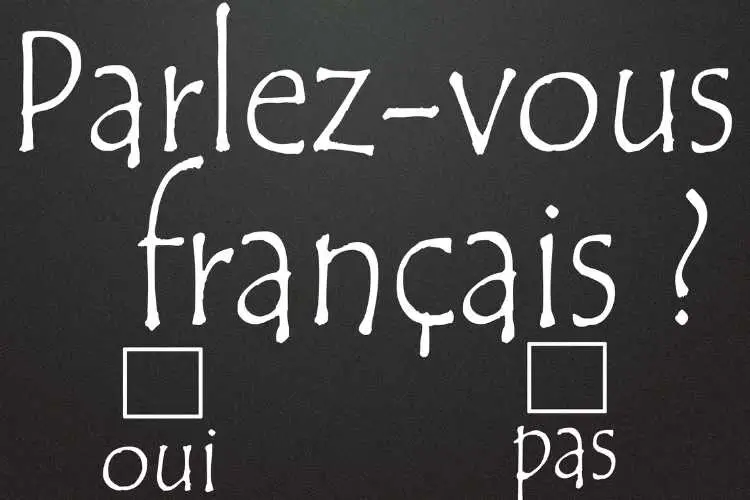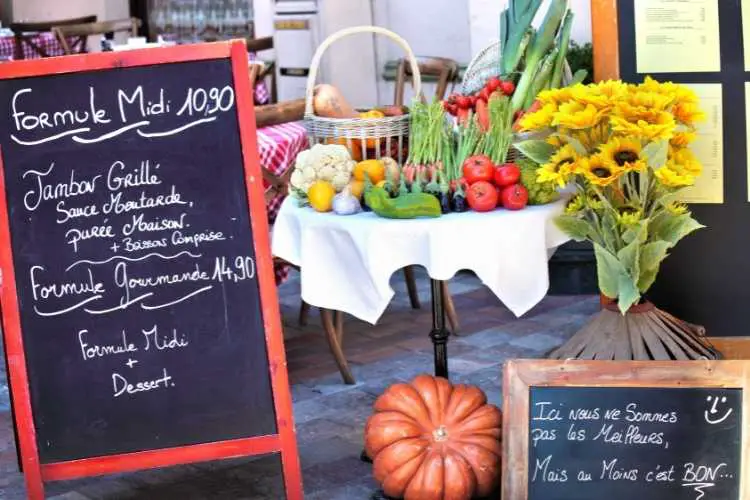As Americans or Brits, we are fortunate enough to live in a country with a language that 20% of the world’s population can speak, whether as a native or second language.
What’s more, English is considered to be the most studied language in the world and so, it’s not difficult for us to become complacent and never bother to learn another tongue.
Thinking about this, Americans and other native English speakers often jet off on a holiday without giving a second thought to the fact that they may not be easily able to communicate with people.
It’s almost taken as a given that somebody in your vacation location will be able to muster up an English conversation, but is this the right attitude to take?
How to learn French for your vacation
I have spent many years studying the French language and I have to say, it’s been a challenge. Even after ten years and several diplomas, I still find myself stumbling upon words and phrases that I don’t have the foggiest clue how to translate.
It’s even more trying when chatting with French friends online who use colloquialisms and abbreviations that can make your brain hurt. But don’t let that put you off; it’s all part of the fun of learning a new language.
There have been many times that I have attempted to teach French to my friends and family. I even had one friend, some years back who was planning a skiing trip to France and wanted a crash course in the basics.

Of course, I obliged and he went on his merry way onto the continent in complete confidence. My kids, on the other hand, haven’t responded quite as well to me shouting ‘pourquoi n’as tu pas nettoyé ta chambre?’ and expecting them to know exactly what I was talking about. But you live and learn; perhaps I’ll try a gentler approach to teaching them.
In any case, this got me thinking about the importance of learning a new language when travelling to another country. Do you really need to learn French when heading off to France, or would you be able to get away with not knowing a word?
In truth, even learning the very basics can be a huge advantage and it’s something of a compliment to the locals.
Why we shouldn’t expect everyone to speak English
Here in the UK, we are the first to complain when expats move to the country without first having gotten to grips with the language. I hear it all the time and some people will even extend this hostility to tourists.
Why come to the UK if they aren’t able to communicate with us? It’s just rude! But the same people guilty of uttering those words are also the first to flit off without first having learned a single word of the language spoken in their destination country. Double standards?
One of the main reasons that you should stop expecting folks in other countries to speak English is simple; you’re a guest there. If you expect travellers to learn English when visiting our shores, surely you should extend that same expectation when travelling. All too often, people assume that since English is so widely spoken, there won’t be an issue.
If you go somewhere with a lot of tourists, you may well find that the locals have a good knowledge of English. Heck, in some places, they prefer to speak it.

On my many visits to Paris, I have actively attempted to speak French but once those Parisians catch even the slightest sniff of an American or English accent, they’ll be babbling away like a true Anglo in no time. They like the practice. But the thing here is that they’ve been given the choice!
If you then head to a more remote area of France, you may find that the local’s grasp on the English language is nowhere near as good.
My parents had an experience with this when travelling to a tiny village in the centre of France where nobody understood a word they were saying. They called me, explaining that these people were incredibly rude.
No, they’re not. They just don’t understand and you should have learned some French! Was my reply. Baffled, they asked for a few essential phrases and went on their way. I think next time, they’ll be better prepared.
The thing is that, in places like this, there isn’t a need for the locals to learn another language, so they don’t. And why should they on the off chance that you or I decide we fancy a fishing weekend or a camping trip to their local area?
In addition to this, learning a language helps you to better understand culture. France may be similar to the UK in many respects but there are some vast cultural differences. Minor etiquette considerations that a we might not even think about could be hugely offensive to a French person.
For example, when dining at a French person’s home, turning up empty handed is considered to be incredibly rude. When you learn a language, you often also learn these cultural cues that can really help you when travelling.
Do you really need to learn French when travelling to France?
If you’re asking yourself this question then it’s obvious that you have, at the very least, considered learning some French for your upcoming visit. If that seed has been planted in your mind then what is the harm in allowing it to grow?
Let’s face it, if you don’t learn any French, you’re not going to find yourself alienated and unable to do something as simple as ordering food and drink. With hand signals and pointing at the menu, you’ll end up with something edible. But if you don’t like the idea of eating snails or foie gras, then it might be best to learn how to at least read the menu in French!

That said, while you may be able to amble your way through awkward translations and difficult interactions, nobody wants that stress when they are trying to enjoy a holiday. Heading away on vacation is meant to be relaxing and struggling to communicate is anything but.
As I mentioned earlier, going to a very touristy place like Paris or top holiday spots in the South of France will likely mean that there are a lot of anglophones around. You probably won’t struggle at all. But even so, it’s just polite to attempt to communicate with the French in their native tongue.

If you worked in a shop, a restaurant or a tourist attraction with a lot of foreign visitors, would you not tire of having to engage your language brain every minute of your working day?
Give the poor French folk a break and utter the odd ‘bonjour’ every now and again; it won’t kill you, I promise. And like I’ve said, they’ll probably want to speak English anyway!
Again, I have to reiterate that, if you are going somewhere remote then the chances of the locals being able to speak English are quite low. You simply cannot expect them to and you also can’t be shocked when, on your arrival, you find a bemused looking hotel receptionist who doesn’t understand anything but ‘j’ai reservé une chambre.’
So, do you really need to learn French when travelling to France? Yes, I think you do. You don’t need to have a huge understanding of complex conversation; unless you’ve got years to study, which I’m guessing you don’t.
But learning the most basic skills can be a lifesaver when out and about. Choose your battles wisely and don’t try to learn too much too soon.
When you’re a tourist, the most you’ll need to know is how to check into your hotel, how to order food, how to ask for directions and potentially seek medical or emergency advice. Cover these basics and I am confident that you’ll be good to go!
What do the locals think?
Earlier on, I was talking about how British and American people are the worst when it comes to complaining about foreign visitors not being able to speak our language. We love a good moan, after all! But how do you think a French person feels when hoards of Brits come flooding across the channel without knowing their un, deux, trois?
It’s got to be just as infuriating, n’est-ce pas? It’s only human to not want to have to struggle to communicate so with that in mind, why don’t we consider what the locals will think when you start chatting away in their native tongue.
One of the problems for new language learners is that they’re embarrassed. I was too the first time I set foot on French soil. You suddenly have to switch your brain into a new way of thinking and rather than just speaking as a reflex, you need to consider every word that comes out of your mouth; does it make sense? Am I saying it right? What if I get mixed up?
All of these questions make you feel as though you shouldn’t attempt to speak French because you don’t want to make a fool of yourself. But ask yourself another question; when a non-native English speaker talks to you and makes errors, do you judge them?
Are you unable to figure out what they’re saying? The answer is likely no so what makes you think that French locals are going to think badly of you for trying?
If anything, the locals love it when foreigners have a go at speaking their language. Even if you don’t get it right, they feel as though they’re being given respect.

What’s more, if you’re away on vacation and hoping for a holiday romance, you’ll be pleased to know that, according to studies, the French find the British accent incredibly sexy; who said the two nations didn’t like one another!
And if you’re worried about not being understood, don’t be! In my experience, French people are not backwards in coming forwards to tell you that you got something wrong.
I regularly use language exchange apps and the Frenchies I chat to will quickly pull me up if I get something wrong; even if it’s a simple le or la mix up. But they’re not precious about it, I think they might even find it endearing when we make small mistakes.
That said, you do need to keep in mind that when they do correct you, it isn’t going to be a softly softly approach. Despite the stereotype, the vast majority of French people ARE NOT RUDE but they also don’t mince their words.
If they have something to say, they’ll say it. But it’s said and then they forget about it. So if it feels as though their correction of your mistake is stern or straight to the point, don’t take it personally, that’s pretty normal.
You’re never too old to learn French
One of the things that puts a lot of people off learning a new language is that they think they’re too old to pick up new skills. Now, I’ll be straight with you; as we age, it does take a little more effort to memorise and retain new information. But that doesn’t mean that it’s impossible to learn a new language.
According to The Guardian, one of the biggest hurdles for language learners as they get older is pronunciation. You’re used to the way that your language sounds and is spoken so when learning a new language, it can be tricky to wrap your tongue around some of the sounds. That said, even if you don’t get it spot on, native speakers will know what you’re talking about.
Think about when you meet a foreign person speaking English. They may pronounce words slightly differently but you don’t misunderstand them and it’s still perfectly simple to indulge in conversation.
It’s important to treat language learning in the same way you would expect a child to learn their native language. It starts with baby steps and takes years to perfect. If you have children, you’ll know that even by the ages of five or six, their English is still far from perfect. However, after learning for three or four years how to speak, they’ve got a grasp on it that makes them perfectly understandable.
The same can be said for an adult learning to speak French. The great thing is that there are so many different approaches to language learning. With courses based around different learning styles, you will be able to find something that works for you.
Some of us learn a language more easily through exposure; watching movies, listening to music, reading books and those kinds of things will immerse you into the language and you’ll pick things as you go along. Other people like a very structured approach and want to learn the ins and outs of grammar, allowing them to structure sentences to perfection.
There are also those who find looking at images coupled with words or sentences to be a viable way of learning. No matter what your style (or your age), you’ll begin to pick up the French basics in no time at all.
How long does it take to learn the basics of French?
At first glance, French might seem like a pretty difficult language to learn. After all, it is completely different to English in so many ways.
All those accented letters, words that appear to have a few letters thrown on the end for good measure but are never pronounced and irregular verbs that could make your eyes water. But, when it comes down to the crunch, French isn’t as difficult as you might think.
According to experts, you can achieve basic fluency in even a very difficult language in 72 days, provided that you dedicate the time to consistent study. This means studying for ten hours a day and for lower-level languages, you might achieve this in as little as 48 days.
Of course, not many of us have ten hours a day to spare; things like work, children, social responsibilities and other things certainly can get in the way.
However, that doesn’t mean that, as a busy adult, you can’t learn a new language, especially if you’re only looking to pick up the basics. But how long it takes you to learn these basics largely depends on you.

Some people are naturally more gifted in picking up new language skills whereas others may take a little longer. With some of the amazing language learning apps available today, you can dedicate as little as 10 minutes a day and, over the course of a few weeks, will have developed enough knowledge to make your way around France without making too many faux pas.
For example, I am currently taking my language learning to the next level and have started using a language app to learn Hindi. Did I ever think that I’d get past understanding the devanagari script? No, I did not.
Yet here I am a few months down the line, able to relatively easily pick out sounds and words from those seemingly impossible to understand characters. And that’s with very sporadic practice. So, if you’re looking to learn French for your vacation, you might not need as much time as you think to be able to muster basic communication.
If you’re still sceptical and concerned that French is going to be too much of a challenge, let me try to put your mind at ease. There are a good few reasons that this isn’t a tricky language to learn, despite what you might initially believe.
One of the joys of learning French is that it uses the same Latin alphabet as we do. OK, there are a few accented letters to wrap your head around but they’re simple…I promise. Unlike learning something like Hindi, Japanese or Mandarin, you aren’t fighting against symbols that are totally alien to you. Moreover, many of the French letters have similar pronunciation to English so this is a major advantage.
Think about English and how many different ways there are to pronounce groups of letters…rough, tough, bough, though, I’m looking at you! There’s none of that in French. While some groups of letters may have a rather odd-sounding pronunciation, the one thing that does benefit French is that there is consistency. Once you master a sound, there won’t be any nasty surprises down the line.
Grammar rules in French can seem incredibly scary at first but, for the most part, the rules are pretty consistent and straightforward. Yes, it does take some time to gain a decent understanding but once you do, you’ll find yourself applying the rules without thinking.
I will point out that there are some pretty nasty irregular verbs and the like that will try to catch you out but it can be helpful to make a note of these as you learn them so that it’s easier to commit them to memory.
Should you learn French for your next vacation to France?
Learning a new language can feel like a terrifying task. There’s no denying that there is a hell of a lot to learn and even when you’re faced with the basics, it can seem like…well…another language!
But that certainly is not an excuse to ditch the French dictionary and hope beyond all hope that the locals in your chosen destination will have taken the time to learn your language. That’s an arrogant and slightly naive way of thinking.
If you’re heading to France, there may be places where people have a good knowledge of English and may even want to speak it with you. But that certainly isn’t a given.
There are some villages in the depths of remote France that lead a more traditional way of life and learning foreign tongues is not something that they pride themselves on; non!
So, pull up your britches and download that language learning course, switch on a French movie or find a language exchange buddy. You’ll thank me when you get there!






